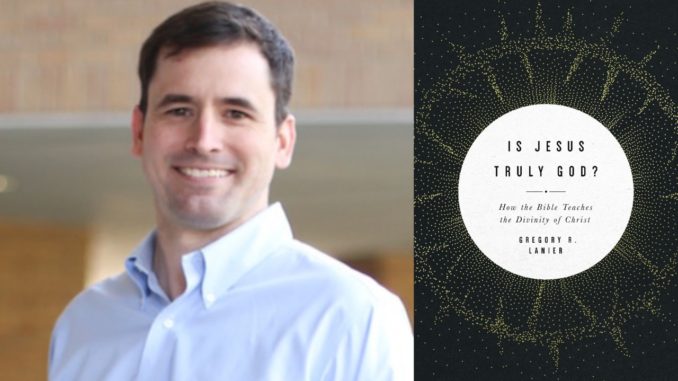
Podcast (beyond-the-page): Play in new window | Download
Subscribe: Apple Podcasts | RSS
It seems like it’s a simple question with a simple answer. Is Jesus Truly God? Yes. Next question, please. But it’s a question far from settled in the realm of apologetics. We need more than a simple “yes” when talking to our Jewish and Muslim friends. And even within Christianity, it’s such a foundational question that many believers never really learn the why behind their yes.
Greg Lanier found this out when dealing with students in seminary and those preparing for ordination. They had all the right beliefs, but weren’t always great at expressing why Jesus is truly God. He wrote a handbook on the answer. And I interviewed him about it. It’s a fun conversation.
The Interview
This excerpt has been edited for conciseness and clarity. Listen to the full podcast episode by clicking the player above or finding us wherever your pods are cast.
Josh Olds: This is a foundational—a crucial—Christian doctrine. You’d kind of think that what we’ve needed to say on the topic has already been said in so many different ways. What was the impetus for you to sit down and say, “We really still need to be talking about this?”
Greg Lanier: Sure. That’s a great question. There’s been kind of a slightly funny response of many folks in the Christian church, that’s basically just “Yes, let’s move on.” We know it to be true, but I found not only in pastoral ministry, but also even in academic ministry with students who’ve done a lot of reading, that many of them actually struggle to articulate why they think Scripture says this. There’s been a whole lot of good stuff has been done over the past two decades on the topic, but it has mainly been in journals and in academic monographs, and so I felt like I needed distill that down to something that my mom would read.
Josh Olds: For a lot of the foundations of faith, if you grew up in the church, you learn these doctrines at such an early stage of life. Jesus is God is something you teach your three and four-year-old. Those doctrines that we learn so early in life, you never go back and relearn them at a level that is appropriate for a teenager or a young adult or a senior citizen. Those Sunday school doctrines stay at the Children’s Sunday school level.
Greg Lanier: So you can say the same thing about “Why do we have so many books about the Gospel?” Don’t we know what the gospel is? You might have learned “Jesus died for your sins” as a kid, but like actually articulating it robustly as an adult is something that we often just assume, as opposed to actually do.
And there’s a big apologetic side as well. If you look at, mainly Islam, but if you also look at Jehovah’s Witnesses or even Mormonism—which has kind of a strange understanding of divination—but certainly with Islam. One of their pillars in how they approach Christianity is a denial of the Divine sonship of Jesus. And so, with the billion plus Muslims, that’s a big dividing line to overcome, apologetically.
The Book | Is Jesus Truly God?
 Read Life is Story’s full review here.
Read Life is Story’s full review here.
The question of Jesus’s divinity has been at the epicenter of theological discussion since the early church. At the First Council of Nicaea in AD 325, the church fathers affirmed that Jesus is “true God from true God.” Today, beliefs such as this one are confessed through creeds in churches around the world, and yet there remains confusion as to who Jesus is.
New Testament scholar Greg Lanier traces the rich roots of creedal Christology through the Scriptures, explaining six ways that the Bible displays Jesus’s divinity. As you discover the overwhelming biblical evidence for the divinity of Christ, you will be drawn to the inescapable conclusion that the man Jesus Christ is more than just a footnote in history—he is truly God.
The Author | Greg Lanier
 Greg joined the faculty of RTS Orlando in 2016 and teaches courses related to New Testament exegesis and interpretation, Greek, and preaching. He is also an Associate Pastor (part-time) at River Oaks Church and is ordained in the PCA. He lives in Oviedo with his wife, Kate, who is an optometrist, and their three daughters. Before moving to Florida, the Laniers lived in Cambridge, England, where Greg finished his doctorate; while in England, they were actively involved in an evangelical Anglican church.
Greg joined the faculty of RTS Orlando in 2016 and teaches courses related to New Testament exegesis and interpretation, Greek, and preaching. He is also an Associate Pastor (part-time) at River Oaks Church and is ordained in the PCA. He lives in Oviedo with his wife, Kate, who is an optometrist, and their three daughters. Before moving to Florida, the Laniers lived in Cambridge, England, where Greg finished his doctorate; while in England, they were actively involved in an evangelical Anglican church.
Prior to their overseas sojourn, Greg and his family lived in Charlotte, NC, where he attended RTS Charlotte, served as teaching assistant to Dr. John Oliver (now retired), and served as a pastoral intern at Uptown Church PCA under Dr. Michael Kruger (campus president at RTS Charlotte). Before discerning the Lord’s calling into pastoral and academic ministry, Greg worked in various professional roles in Charlotte, Birmingham, and Atlanta, ranging from management consulting to private equity investing.
His research interests include the Synoptic Gospels, canon and textual criticism, the use of the OT in the NT, the Pauline epistles, and the Septuagint. He also serves on the editorial board of the Journal of Biblical and Theological Studies, and he maintains a blog.
